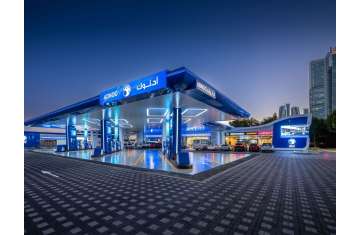Urgent
Sultan bin Ahmed visits 'Kanaf' centre in Sharjah
 Dubai Aerospace Enterprise earns $85.8 million during first quarter
Dubai Aerospace Enterprise earns $85.8 million during first quarter
 UAE, Ecuadorian Presidents discuss strengthening bilateral cooperation
UAE, Ecuadorian Presidents discuss strengthening bilateral cooperation
 NMDC Group reports robust financial results for Q1 2025
NMDC Group reports robust financial results for Q1 2025
 EU to consider lessons learned from Spanish, Portuguese blackout
EU to consider lessons learned from Spanish, Portuguese blackout
 Abdallah Raweh stringe partnership internazionali con un’élite di scienziati europei
Abdallah Raweh stringe partnership internazionali con un’élite di scienziati europei
 ADNOC Distribution Earns $1B Again, Plans 1,000 Stations by 2028
ADNOC Distribution Earns $1B Again, Plans 1,000 Stations by 2028
 Shurooq showcases latest project at Arabian Travel Market 2025
Shurooq showcases latest project at Arabian Travel Market 2025

 Dubai Aerospace Enterprise earns $85.8 million during first quarter
Dubai Aerospace Enterprise earns $85.8 million during first quarter
 UAE, Ecuadorian Presidents discuss strengthening bilateral cooperation
UAE, Ecuadorian Presidents discuss strengthening bilateral cooperation
 NMDC Group reports robust financial results for Q1 2025
NMDC Group reports robust financial results for Q1 2025
 EU to consider lessons learned from Spanish, Portuguese blackout
EU to consider lessons learned from Spanish, Portuguese blackout
 Abdallah Raweh stringe partnership internazionali con un’élite di scienziati europei
Abdallah Raweh stringe partnership internazionali con un’élite di scienziati europei
 ADNOC Distribution Earns $1B Again, Plans 1,000 Stations by 2028
ADNOC Distribution Earns $1B Again, Plans 1,000 Stations by 2028
 Shurooq showcases latest project at Arabian Travel Market 2025
Shurooq showcases latest project at Arabian Travel Market 2025











Comments